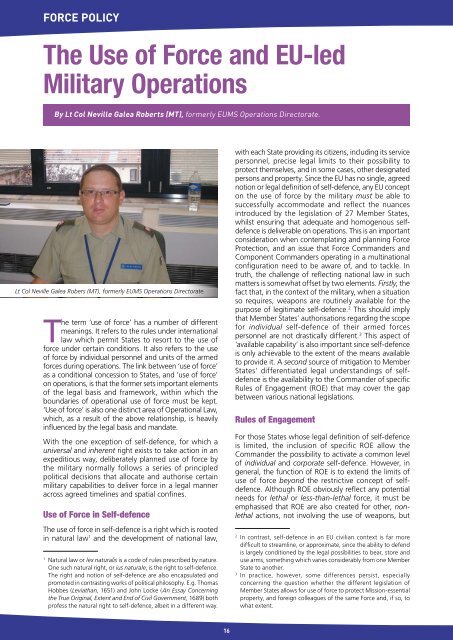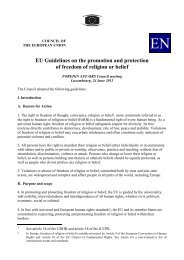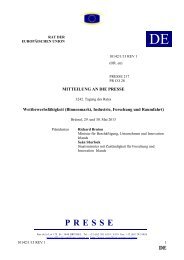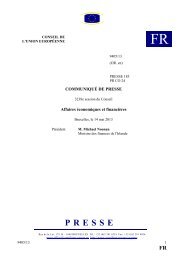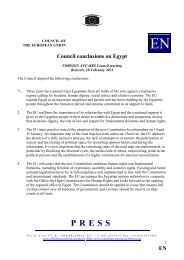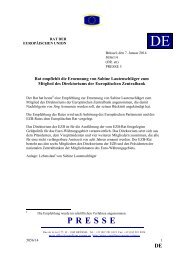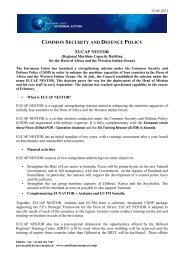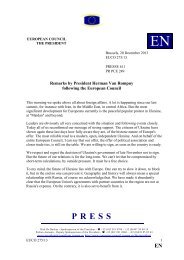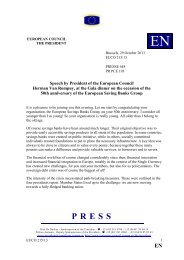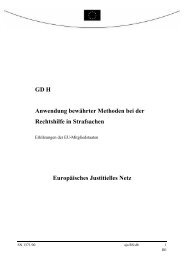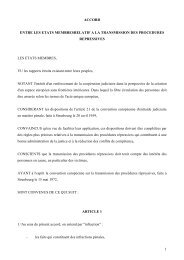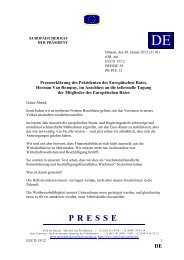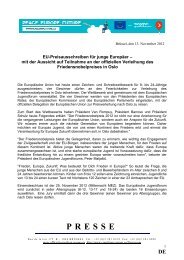Impetus - Europa
Impetus - Europa
Impetus - Europa
You also want an ePaper? Increase the reach of your titles
YUMPU automatically turns print PDFs into web optimized ePapers that Google loves.
FORCE POLICY<br />
The Use of Force and EU-led<br />
Military Operations<br />
By Lt Col Neville Galea Roberts (MT), formerly EUMS Operations Directorate.<br />
Lt Col Neville Galea Robers (MT), formerly EUMS Operations Directorate.<br />
The term ‘use of force’ has a number of different<br />
meanings. It refers to the rules under international<br />
law which permit States to resort to the use of<br />
force under certain conditions. It also refers to the use<br />
of force by individual personnel and units of the armed<br />
forces during operations. The link between ‘use of force’<br />
as a conditional concession to States, and ‘use of force’<br />
on operations, is that the former sets important elements<br />
of the legal basis and framework, within which the<br />
boundaries of operational use of force must be kept.<br />
‘Use of force’ is also one distinct area of Operational Law,<br />
which, as a result of the above relationship, is heavily<br />
influenced by the legal basis and mandate.<br />
With the one exception of self-defence, for which a<br />
universal and inherent right exists to take action in an<br />
expeditious way, deliberately planned use of force by<br />
the military normally follows a series of principled<br />
political decisions that allocate and authorise certain<br />
military capabilities to deliver force in a legal manner<br />
across agreed timelines and spatial confines.<br />
Use of Force in Self-defence<br />
The use of force in self-defence is a right which is rooted<br />
in natural law 1 and the development of national law,<br />
1 Natural law or lex naturalis is a code of rules prescribed by nature.<br />
One such natural right, or ius naturale, is the right to self-defence.<br />
The right and notion of self-defence are also encapsulated and<br />
promoted in contrasting works of political philosophy. E.g. Thomas<br />
Hobbes (Leviathan, 1651) and John Locke (An Essay Concerning<br />
the True Original, Extent and End of Civil Government, 1689) both<br />
profess the natural right to self-defence, albeit in a different way.<br />
16<br />
with each State providing its citizens, including its service<br />
personnel, precise legal limits to their possibility to<br />
protect themselves, and in some cases, other designated<br />
persons and property. Since the EU has no single, agreed<br />
notion or legal definition of self-defence, any EU concept<br />
on the use of force by the military must be able to<br />
successfully accommodate and reflect the nuances<br />
introduced by the legislation of 27 Member States,<br />
whilst ensuring that adequate and homogenous selfdefence<br />
is deliverable on operations. This is an important<br />
consideration when contemplating and planning Force<br />
Protection, and an issue that Force Commanders and<br />
Component Commanders operating in a multinational<br />
configuration need to be aware of, and to tackle. In<br />
truth, the challenge of reflecting national law in such<br />
matters is somewhat offset by two elements. Firstly, the<br />
fact that, in the context of the military, when a situation<br />
so requires, weapons are routinely available for the<br />
purpose of legitimate self-defence. 2 This should imply<br />
that Member States’ authorisations regarding the scope<br />
for individual self-defence of their armed forces<br />
personnel are not drastically different. 3 This aspect of<br />
‘available capability’ is also important since self-defence<br />
is only achievable to the extent of the means available<br />
to provide it. A second source of mitigation to Member<br />
States’ differentiated legal understandings of selfdefence<br />
is the availability to the Commander of specific<br />
Rules of Engagement (ROE) that may cover the gap<br />
between various national legislations.<br />
Rules of Engagement<br />
For those States whose legal definition of self-defence<br />
is limited, the inclusion of specific ROE allow the<br />
Commander the possibility to activate a common level<br />
of individual and corporate self-defence. However, in<br />
general, the function of ROE is to extend the limits of<br />
use of force beyond the restrictive concept of selfdefence.<br />
Although ROE obviously reflect any potential<br />
needs for lethal or less-than-lethal force, it must be<br />
emphasised that ROE are also created for other, nonlethal<br />
actions, not involving the use of weapons, but<br />
2 In contrast, self-defence in an EU civilian context is far more<br />
difficult to streamline, or approximate, since the ability to defend<br />
is largely conditioned by the legal possibilities to bear, store and<br />
use arms, something which varies considerably from one Member<br />
State to another.<br />
3 In practice, however, some differences persist, especially<br />
concerning the question whether the different legislation of<br />
Member States allows for use of force to protect Mission-essential<br />
property, and foreign colleagues of the same Force and, if so, to<br />
what extent.


